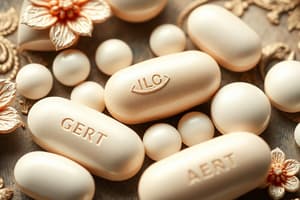Podcast
Questions and Answers
What is the primary reason tablets are more widely accepted than capsules?
What is the primary reason tablets are more widely accepted than capsules?
- Faster absorption
- Lower cost (correct)
- Easier to swallow
- More customizable dosage
Tablets are always biconvex in shape.
Tablets are always biconvex in shape.
False (B)
What method is commonly used to prepare tablets?
What method is commonly used to prepare tablets?
Compression
Tablets may contain medicaments with or without suitable ________ prepared by compression or molding.
Tablets may contain medicaments with or without suitable ________ prepared by compression or molding.
Match the following excipients to their purposes:
Match the following excipients to their purposes:
Which of the following is NOT an excipient used in tablets?
Which of the following is NOT an excipient used in tablets?
Flashcards are hidden until you start studying
Study Notes
Oral Solid Dosage Forms
- Tablets and capsules are the most popular forms of oral solid dosage forms.
- Tablets are preferred over capsules due to their lower cost, ease of handling, packaging, and identification, and manufacturing efficiency.
- Tablets are defined as solid unit pharmaceutical dosage forms containing medication with or without excipients.
- Tablets are typically prepared by compression, referred to as "Compressed Tablets."
- Compressed tablets are usually circular in shape and can be flat or biconvex.
- Excipients are added to tablets for various purposes:
- Diluents, binders, glidents, and lubricants: Ensure efficient tableting.
- Disintegrants: Promote tablet break-up in the digestive tract.
- Sweeteners or flavors: Enhance taste.
- Polymer coating: Improves tablet smoothness for easier swallowing, controls the release rate of the active ingredient, and increases resistance to the environment.
Studying That Suits You
Use AI to generate personalized quizzes and flashcards to suit your learning preferences.




